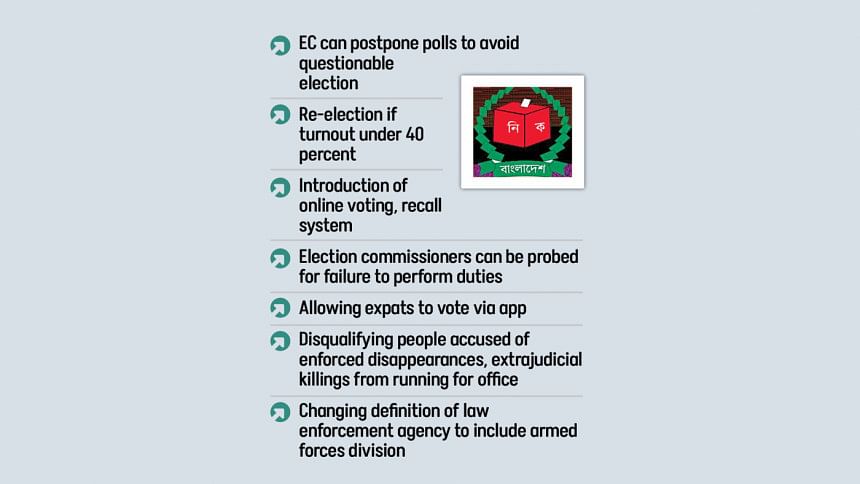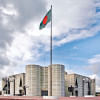Electoral reform: More powers, accountability

The Electoral Reform Commission has recommended increasing the Election Commission's power to postpone national polls and introducing methods to hold election commissioners accountable for failing to do their constitutional duties.
The reform commission submitted its report to the government yesterday and recommended an investigation into the irregularities by "election commissioners and officials" during the last three national polls and taking action against them.
The report proposed that people convicted by the International Crimes Tribunal be disqualified for election.
It said a special law is necessary to bar people accused of serious human rights violations like enforced disappearances, extrajudicial killings, attacks on journalists and human rights activists as well as corruption from running for parliament.
"The reform commission has proposed an investigation against those who have exiled our electoral process over the last three elections; not just the officials, but also commission members," said Badiul Alam Majumder, chief of the reform commission, while presenting the recommendations to Chief Adviser Prof Muhammad Yunus.
He mentioned the allegation of ballot-box stuffing the night before the 2018 election. "This needs to be investigated to bring those responsible to justice."
In January 2019, the Jatiya Oikya Front alleged before the EC that between 30 and 60 percent of the votes were cast the night before.
The same month, Transparency International, Bangladesh in a study found that stamping of ballots took place the night before election day in more than one centre in 33 of the 50 surveyed constituencies.
The last general election in January had been at the centre of controversy as it was not competitive and inclusive due to a boycott by the major opposition parties, including the BNP. The Awami League had to field dummy independent candidates, many of whom were leaders of the party, to make the polls appear participatory.
The 2014 election was also one-sided, in which 153 lawmakers out of 300 were elected unopposed as most of the opposition, including the BNP, boycotted the election.
The AL-led alliance won more than two-thirds majority in all three national elections held under the Hasina government.
A section of police officials in December admitted that they were under pressure from higher authorities while performing duties during the last three national elections.
In a meeting with the reform commission, they also alleged that there were "financial transactions" during the polls.
Badiul said that many complaints are filed during elections, but they are never resolved, and many perpetrators escape accountability. The reform commission recommended steps to ensure that these perpetrators are held accountable.
To reform the electoral system, he said, the commission proposed ensuring the independence of the Election Commission, empowering it, and holding it accountable.
The commission proposed granting the EC the authority to suspend or cancel elections and call re-elections. It recommended entrusting the EC with the full responsibility of appointing its secretary.
It proposed that the executive would require prior approval of the EC for any actions that could influence elections.
"If democratic processes, part of the constitution's basic framework, are at risk due to controversial elections like that of 2014, 2018, and 2024, the Election Commission shall be given the authority to suspend the election for 90 days after showing reasonable cause. But it should be done with the approval of the Supreme Court's Appellate Division through the president," the report said.
The EC's legal, financial, and administrative proposals will be presented before a parliamentary committee instead of a ministry, the report said.
"If election commissioners fail to perform constitutional duties or breach their oath, they will be investigated by the proposed parliamentary committee, and appropriate measures will be taken, with recommendations sent to the president," the commission said.
It recommended appointing returning and assistant returning officers from the EC's own staff on a priority basis. If sufficient EC personnel are not available, appointments will be made from other government services.
The reform commission report proposed that persons declared fugitives by the courts will be disqualified from national polls.
It also said that persons holding executive positions in private organisations will be required to resign from their posts at least three years before running for office. Elected representatives of local government institutions will be barred from running for parliament if they do not resign from the local government body.
The reform commission recommended avoiding the use of electronic voting machines (EVMs) in elections, and changing the definition of law enforcement agencies during elections to include the armed forces division.
It recommended re-election in constituencies where the turnout is less than 40 percent.
It proposed the reintroduction of the "No-Vote" on ballots. If "No-Vote" wins, that election will be cancelled, and candidates from that cancelled election will not be allowed to contest the re-election.
The election expense should be fixed at Tk 10 per voter and all election expenses must be managed through the banking systems or mobile financial services, the reform commission report said.
Election expenses should be closely monitored by the EC and the returns of election expense accounts for candidates and parties will be audited, and penalties will be imposed for discrepancies.
Independent candidates will be required to submit the consent of 500 voters instead of 1 percent of constituents. A candidate can contest the election from only one parliamentary seat, instead of maximum three.
The EC will be tasked with verifying the affidavits submitted by candidates and the affidavit forms will change drastically, the report said.
"It will be mandatory to disclose overseas assets. Any fake declarations will lead to the cancellation of the nomination, or the cancellation of the election to that seat," said Badiul.
Presenting these recommendations at a press briefing in their office inside the premises of the Jatiya Sangsad, Badiul said a code of conduct law must also be enacted for parliamentarians to govern their conduct while in power. MPs would be held accountable for actions that violate principles pertaining to conflict of interest, he said.
"The perks and protocols that elevate parliamentarians to the status of a zamindar (landlord) will be significantly curbed," he added.
The provision of tax-free vehicles, residential plots and allowances for MPs should be reviewed and amended, the report said. A "Member of Parliament Conduct Act" should be passed to make the MPs annually declare their assets and disclose any conflicts of interest.
It said a system should be introduced so that voters can "recall" (remove) an elected MP.
The proposal suggests that a person aged 21 will now be eligible to contest parliamentary polls, the minimum age to become an MP is currently 25.
The reform commission sought a new law to appoint the election commissioners and their chiefs based on political consensus and meaningful participation of civil society, with transparency.
It recommended imposing a two-term limit on prime ministers. Any head of government elected twice will be ineligible to become president.
One person cannot hold the positions of prime minister, leader of the house, and party chair simultaneously.
The commission proposed a bicameral legislation system. The lower house will have 400 seats, and of them 100 will be for directly elected women.
The upper house will have 100 seats based on the proportional representation system. Half of the seats should be filled by party members, and the remaining 50 percent should be elected from independent candidates, civil society, academics, scientists, human service providers, labour representatives, women's development activists, cultural figures, and marginalised groups. However, at least 30 percent of the members of the upper house from both party and independent groups should be women.
The president should be elected through a larger electoral college formed by the members of both chambers of parliament and all elected representatives of local government.
The reform commission also proposed that the opposition party MP should be given the position of deputy speaker.
"We recommended that all elections be held within the tenure of a caretaker government," said Badiul. This includes local government elections.
The commission recommended that the National Constitutional Council select the chief adviser to the election-time caretaker government and the chief adviser select the 20 government members.
"We have recommended the formation of a permanent commission called a local government commission," Badiul said. And local government elections will be held before national elections.
The political party registration system will undergo major changes once the recommendations of the reform commission are implemented.
People convicted of serious human rights violation will be barred from holding positions in political parties or committees.
Additionally, political parties will be required to conduct internal elections through secret voting to elect their leadership, and a mandatory audit of party funds will be made to ensure transparency.
Political parties will also need to renew their registration every five years, and a new rule will cancel the registration of any party that fails to participate in two consecutive elections.
"No parties will be allowed to have sycophant student, teacher and labour wings under any kind of names," the reform commission said.
The commission suggested national ID cards for all Bangladeshi citizens aged 16 and above, with an additional registration process for children aged 10 or older in the future.
The report highlight efforts to register overseas Bangladeshis as voters and using passport database information to streamline the process.
Expatriates who are registered by October 2025 will have the opportunity to vote in the national elections through a proposed postal voting system.
New provisions will also ensure that individuals turning 18 before the election schedule are included in the voter list.
The commission proposed mobile apps-based postal balloting so that expatriate Bangladeshis can cast their votes. The online voting system will be developed with the help of a technical task force, composed of national and international experts.

 For all latest news, follow The Daily Star's Google News channel.
For all latest news, follow The Daily Star's Google News channel. 









Comments